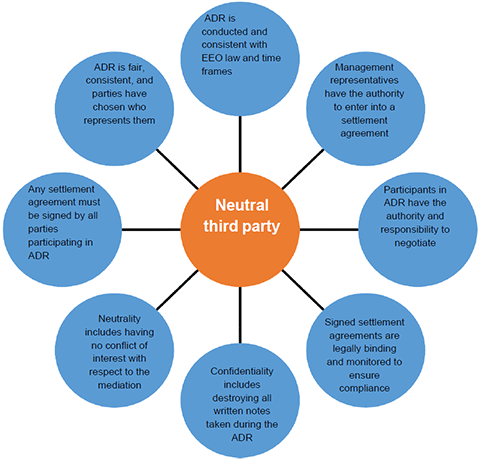Equal Employment Opportunity Alternative Dispute Resolution
What is Alternate Dispute Resolution (ADR)?
ADR is a process in which a neutral third party assists the Complainant and the Exchange representative in reaching an amicable resolution through the use of various techniques. ADR describes a variety of processes to resolve conflicts in an effort to avoid the cost, delay, and unpredictability of the traditional legal process while at the same time improving workplace communication and morale. Mediation is one of the more commonly used type of negotiation in the ADR process.
Why is ADR beneficial?
Exchange representatives and Complainants have realized that utilizing ADR during the EEO process has many advantages.
- ADR offers all involved parties the opportunity for an early, informal resolution of disputes, in a mutually satisfactory fashion.
- Rather than receiving a decision from an unknown third party, such as an administrative judge, the parties have the opportunity to write their own agreement in a manner which satisfies both of their needs.
- Not only does ADR provide a Win-Win resolution for all involved parties, but it usually costs less, saves time , and uses fewer resources than traditional administrative or legal processes.
- Complainant's working relationships can improve rather than deteriorate due to ongoing legal battles, and the overall employee morale can be enhanced when the Exchange representative is viewed as open-minded and cooperative in seeking to resolve EEO disputes.
How does ADR work?
The Exchange is not required to offer ADR in every EEO case; rather the Exchange has the discretion to decide which EEO cases are offered ADR. Complainants may not file a new complaint based on the refusal to offer ADR in their particular case.
If ADR is offered during the informal stage of the EEO process, the Complainant may choose between participating in ADR or the traditional EEO counseling procedures. Once the Complainant elects to participate in the ADR, all EEO counseling activities will end. Electing ADR increases the informal EEO processing period from 30 to 90 days.
If the complainant files a formal complaint, the Exchange may also choose to offer ADR during the formal complaint stage.
If ADR is Chosen
The Specialist shall advise the complainant that if the dispute is resolved during ADR, the terms of the agreement must be in writing and signed by both the complainant and the Exchange representative.
The Specialist shall advise the complainant that if the matter concludes without a resolution during the ADR process, or if the matter has not been resolved within ninety (90) calendar days from initial contact with the EEO Specialist, the complainant will receive notification of their right to file a formal complaint of discrimination.
Nothing said or done during attempts to resolve the complaint through mediation, including the failure by the Exchange to provide a mediator, can be the subject of an EEO complaint.
The Specialist should have no further involvement in resolving the matter until after being informed of the outcome of the ADR.
If ADR is not chosen
The Specialist must advise the complainant that if he/she does not choose to participate in the Exchange's ADR program, the dispute(s) about which he/she contacted the EEO Specialist will be handled through the Exchange's traditional EEO counseling procedures.
The Role of the Specialist
When the Complainant elects to participate in ADR, the Specialist who advised them of their rights and responsibilities is precluded from attempting to resolve the matter.
Role of the neutral third party
In any EEO ADR, the neutral third party’s duty to the participants is to be "impartial, honest, and to act in good faith." Individuals used in the ADR process may be either an EEO Exchange associate who is certified as a mediator for work-place disputes or an employee of the DoD, Investigative and Resolution Division.
Neutral third parties must ensure the following:

Ex: Material or financial interest in the outcome, friend, or co-worker of an involved party, supervisory official over a party r(unless such interest is fully disclosed in writing to all parties and all parties agree that the mediator may serve).
Alternative Dispute Resolution (ADR) Requirements Checklist
Generally, the only participants are the Complainant, Principal Management Official (PMO), complainant and/or management representatives, and the neutral third party. ADR is confidential and the sessions are not taped or transcribed; all notes taken during mediation are discarded.
 |
Generally, the only participants are the Complainant, Principal Management Official (PMO), complainant and/or management representatives, and the neutral third party. ADR is confidential and the sessions are not taped or transcribed; all notes taken during mediation are discarded. |
. Mediation
|
|
. Facilitation
|
 |
If there is a resolution, the EEO office will ensure that all necessary settlement documents are appropriately coordinated, signed, reproduced and copies given to the appropriate parties. |
 |
The EEO office will ensure that the terms of any settlement agreement are legally sufficient. |
 |
The signed and approved settlement agreement is a binding contract between the parties that is enforceable. |
 |
If there is no resolution, the aggrieved individual will be informed of his/her right to proceed with the administrative EEO complaints procedure, and the EEO Specialist will issue the Notice of Right to File a Discrimination Complaint and the formal Exchange Complaint form. |








 Deals
Deals Clearance
Clearance Unit Purchases
Unit Purchases Marketplace
Marketplace Weekly Ad
Weekly Ad